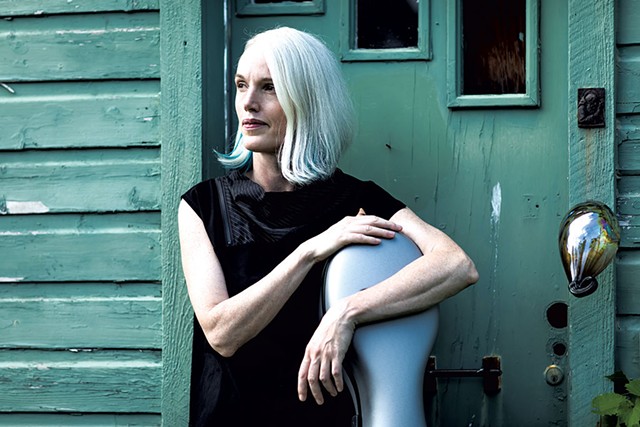
- Luke Awtry
- Zoë Keating
Zoë Keating rarely opens her eyes when she plays the cello. She typically begins by pulling the instrument close in an intimate embrace between creator and conduit. She then lowers her head, long silver and blue locks of hair hanging over her furrowed brow. As her bow nears the strings to strike the first note of another haunting, lush piece of music she has composed, she closes her eyes.
"I've always had stage fright," Keating, 49, reveals to Seven Days near her home in Burlington's South End. "I'd look at my hands and forget how to play the cello — that actually has happened before," she continues. "So I started closing my eyes as a way to cope. If I close my eyes, I'm invisible."
With such anxiety, it's ironic that Keating views playing live music as a way to interact with other humans. Yet it's hard to miss the reverence in her voice when she talks about the audience.
"I'm onstage alone. I don't have a band or anything," she explains. "I'm playing music, but I feel separated from the people listening. And, ultimately, my goal is to be connected to them. This is my weird, twisted way of connecting with other people."
That connection was severed last year upon the outbreak of COVID-19. With no tour dates, Keating found herself sequestered in her house with her young son, Alex — and "full of fear," as she describes it.
But like she has so many times, Keating adapted. For the first time since moving here in 2017, she leaned into life as a Vermonter and explored her adopted city of Burlington. Meanwhile, she doubled down on the other side of her career: composing scores for television and film.
Keating emerged from a dark year that she calls "an annihilation of the self" with no less than an Emmy nomination for the score she co-composed with Jeff Russo to Oslo, an HBO original film about the 1990 Oslo Peace Accord negotiations. It stars Ruth Wilson and is based on a Tony Award-winning play of the same name. The irony of Keating earning her biggest mainstream success while quarantined and unable to tour is not lost on her. Her reaction to the nomination is to have her tongue firmly in cheek.
"Am I still an outsider if I have an Emmy nom?" Keating jokes. "I feel like I snuck into the music industry by tunneling underneath and coming in through a hidden door."
Born in 1972 in Ontario, Canada, Keating took up the cello at age 8. She later attended Sarah Lawrence College in New York, studying electronic music and contemporary composition. Despite her musical talent, she initially entered a career in technology as an information architect and data analyst.
After college, Keating moonlighted in rock bands around San Francisco, eventually joining indie cello-rock act Rasputina in 2004. A few years later she began playing with Amanda Palmer, formerly of the Dresden Dolls. A music career of her own beckoned, but she approached it in a fiercely individualistic manner.
Her drive to compose her own music, her proficiency with technology and her DIY ethos soon led to a glittering solo career. Keating has established herself as a unique performer, a cellist who juxtaposes classical music and ambient electronica.
"She is classically trained, and one can hear the influences of minimalist composers like Philip Glass and Henryk Górecki upon her compositional process," writes journalist Richard Scheinin in a 2018 piece on Keating for SFJAZZ. "Perhaps along with the avant-rock of Sigur Rós."
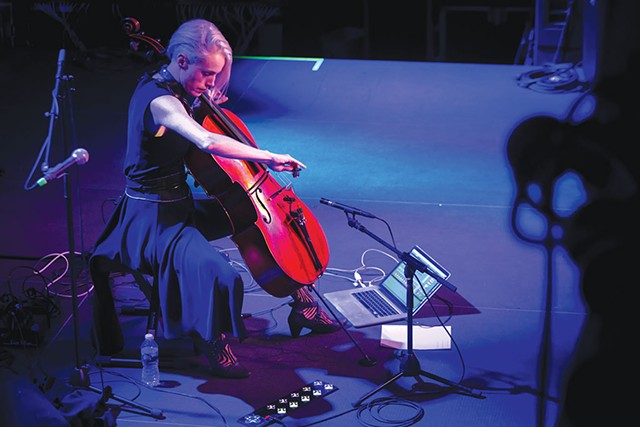
- File: Luke Awtry
- Zoë Keating at Higher Ground
To watch Keating play is to witness a complex and beautiful kind of dance. She cajoles all sorts of tones out of her cello by picking the strings, tapping her bow on the bridge, even lightly beating the body percussively. Once she creates a bedrock of sound, Keating loops wave after wave of melodies, harmonies and countermelodies atop one another, manipulated live with a laptop and foot pedals.
Though Keating describes this process as "pretty simple," it appears to be anything but. The results are dense, colorful compositions that contain a multitude of worlds within their code.
There is no shortage of darkness in Keating's songs, particularly on the four-song EP Snowmelt, a 2018 album in which the artist grapples with how to process grief.
In 2014, four years after the birth of her son, Keating's husband, Jeffrey Rusch, was diagnosed with stage IV cancer. He died the following year. During and after her husband's illness, Keating blogged extensively about their battles with the health care industry. Those posts attracted widespread and, in one case, surprising attention.
"I remember getting this phone call in 2016," she recalls. "This very serious voice was on the phone telling me, 'The President is reading your blog.' Which was just surreal, of course. President Obama was leaving office, and he invited me to come see him in D.C."
Wanting to be closer to her family following Rusch's death, Keating left the California house she had shared with him and moved to Vermont in 2017. However, she didn't get to know her new home until she was forced to stay in it for more than a year.
"I'm so glad I moved to Vermont," Keating says. "This year, being stuck, I explored every nook and cranny of Burlington I could. I just felt immediately grounded here."
It helped that Keating moved into such an artistic neighborhood. One of the first neighbors she bonded with was Creston Lea, a musician and the owner of guitar-manufacturing company Creston Electric.
"Zoë seems to be putting roots down here now, which makes me happy," Lea observes. "I really admire her. Not just for her musical abilities, but for the way she's figured out how to do it all on her own terms. You don't hear about a lot of DIY cellists."
Lea has lived in the neighborhood for 19 years and remembers being the youngest homeowner by far on his street. So, he was excited when Keating arrived.
"The first year she lived here, she was so psyched to settle in and compose at home," Lea recounts, adding that nearby construction in the booming South End "sort of foiled those plans." But, he continues, "she stuck with it and stayed in the neighborhood."
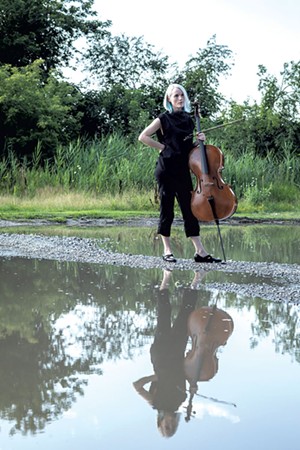
- Luke Awtry
- Zoë Keating
Fortunately, those construction projects were done before the pandemic hit, because Keating then composed and recorded quite a bit of music in her house.
"Once I was home with no tours, I really started working on all the film projects," she explains.
Film work is nothing new to Keating. She has composed for mainstream television shows "Elementary" and "Manhattan," as well as for films such as The Edge of All We Know, a documentary about black holes.
"In the past, it's been a bit of a handicap that I'm not in Los Angeles," she says. "But suddenly, nobody could book anyone in person, so all the scores are remote."
Early in the quarantine, Keating says she was overwhelmed. She was swamped with composition work, as well as caring for her son and recording a follow-up to Snowmelt. Then Oslo came along.
"I knew I had to go for it," she says with a determined look. "I didn't want to take on anything else, but I had to."
She's glad she did, but working on Oslo came at a cost.
"I felt like I was going to have a nervous breakdown," Keating recalls. "I'm composing and recording in a 10-by-10 room with no engineer, working insane hours. I had to work on Oslo every single day. Work, sleep, repeat."
Russo, Keating's frequent collaborator and fellow composer, also comes from a rock background — he played guitar with '90s alt rockers Tonic. Their work received immediate praise for its austere beauty. The Hollywood Reporter praised the film's "melancholy undertow" that is "enriched by Jeff Russo and Zoë Keating's elegant score for piano and strings."
"There is something about Zoë's artistic vibe and mine that is simpatico," Russo tells Seven Days over the phone from Michigan. "I really love the ideas she brings to the table, and I think she feels the same about mine. We're both accustomed to collaborating because of our background; we've played in bands and been in the pop world, which is a much more collaborative medium."
On July 13, Oslo was nominated for two Primetime Emmy Awards, including Outstanding Music Composition for a Limited or Anthology Series, Movie or Special.
"It feels the same every time," says Russo, who won an Emmy in 2017 for his work on the hit TV show "Fargo." "When you put your heart and soul into something, like Zoë and I have done, it feels incredible when your peers recognize that."
"I'm still processing that one," Keating says of the Emmy nod for Oslo. "Honestly, I suspect not that much will change, except that now I get to add 'Emmy-nominated' to my bio."
In the meantime, she is more concerned about her impending return to live concerts. Keating has two shows in Colorado scheduled in early October, ahead of extensive dates in January.
"I'm kind of scared shitless," she admits. "I'm going to burst into tears."
Keating pauses to consider her next words, squinting against the sun above the nearby tree line.
"I know that I'll never take an audience for granted again," she vows. "I tend to attract a lot of shy people with my music. But I'm pretty sure I'm going to try to hug them all after the show."
Keating breaks into a wide grin at the inevitable follow-up question.
"No," she says with a laugh. "I still won't open my eyes while I'm playing."

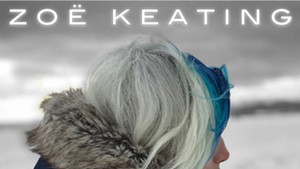
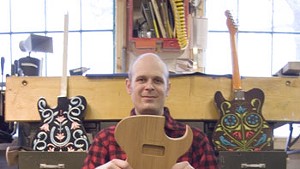








Comments
Comments are closed.
From 2014-2020, Seven Days allowed readers to comment on all stories posted on our website. While we've appreciated the suggestions and insights, right now Seven Days is prioritizing our core mission — producing high-quality, responsible local journalism — over moderating online debates between readers.
To criticize, correct or praise our reporting, please send us a letter to the editor or send us a tip. We’ll check it out and report the results.
Online comments may return when we have better tech tools for managing them. Thanks for reading.